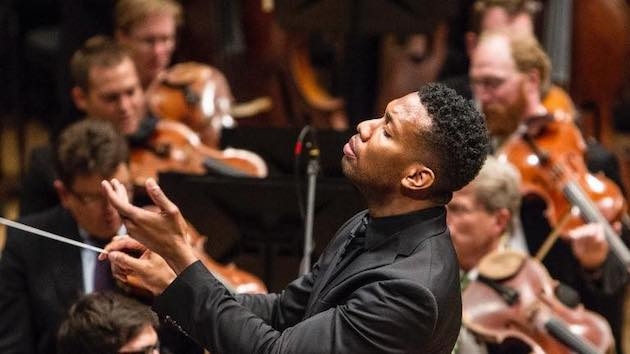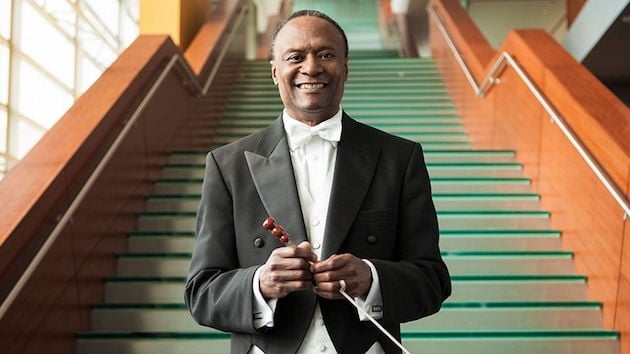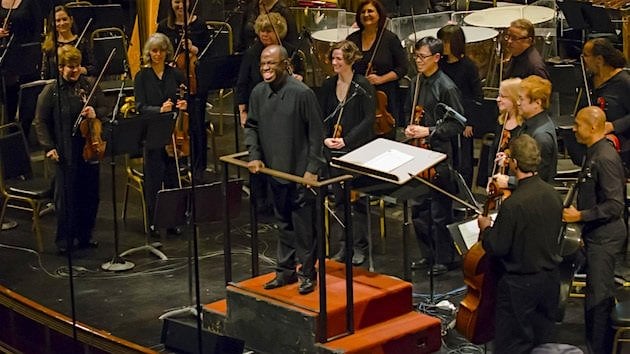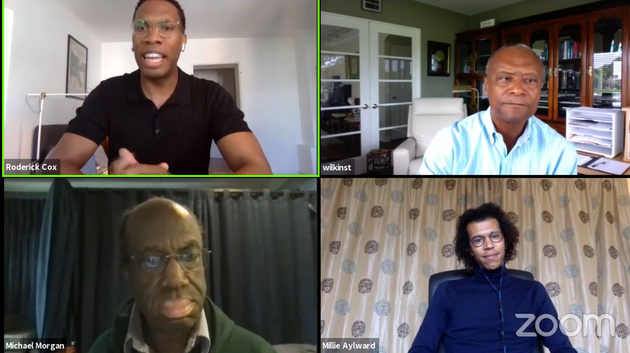
Back in early June, conductor Roderick Cox hosted a conductor’s round table discussion on his Facebook page. It was the second week of the George Floyd protests, just after #TheShowMustBePaused, which almost every major orchestra and opera house in the nation observed. Cox wanted to discuss the experiences of Black conductors, their views on orchestral culture, and whether things were getting better or staying stuck.
Besides Cox, the conductors were: Michael Morgan, of Oakland Symphony; Thomas Wilkins, principal conductor of the Hollywood Bowl Orchestra, music director of the Omaha Symphony, the Boston Symphony’s artistic advisor, education and community engagement, and the Henry A. Upper Chair of Orchestral Conducting at Indiana University; and Jonathon Heyward, chief conductor designate of the Nordwestdeutsche Philharmonie, 2020 recipient of the Sir Georg Solti Career Assistant Award, former Dudamel Conducting Fellow at the Los Angeles Philharmonic (2017–18), and an assistant conductor of the Hallé Orchestra for the past three years. No slouch himself, Cox is a 2018 Sir Georg Solti Conducting Award winner, a rising guest conductor with orchestras from the Phil to The Cleveland Orchestra, Houston Grand Opera, and Philharmonia Orchestra, London. Though based in Europe now, Cox started the Roderick Cox Music Initiative (RCMI) in 2018, a project to help provide scholarship funds to young musicians of color from underrepresented communities, allowing them to pay for instruments, music lessons, and summer camps. Cox is featured in an upcoming PBS/FilmNorth documentary called Conducting Life.
Unlike #OrchestraIsRacist posts on Twitter and Instagram, which center on really awful examples of mistreatment, aggression and micro-aggression, and abuse of power rising to the level of a firing offense, this discussion featured four conductors who are established in the field, two younger and two elder, and so the discussion, while frank and often funny, was more measured and analytical, reflecting these conductors’ triumphs against what still have to be considered long odds. Here is the full discussion, which we have excerpted below. The transcription has been lightly edited for flow and sense on the page.
Cox, acting as emcee, first asked about the conductors’ early lives and their introduction to classical music and conducting, which led to reflections on how we encourage young people of color (or young people generally) to lean into a career in classical music. Cox “grew up in a single parent household with very little money for classical lessons and played on a subpar instrument in high school,” which was very much like the experiences of Wilkins and Heyward who also came from financially stressed circumstances. (Morgan, the outlier, came from a middle-class household.)
Wilkins summed up: Two things I have always said about Black boys having a dream that seems to be out of the norm: I was really fortunate that no one in my community ever said to me, “You know, you’re going to have to choose something else, young Black boys don’t grow up to be conductors.” … It’s part of our responsibility to usher young kids into their dream and to remove any doubt that if they work hard that dream is possible. In all of our cases, there are individuals who not only said the right things, but who did not say the wrong things to us.”
Cox: I still get comments from people who say, “I’ve never seen a Black conductor before,” and let’s be honest, there are very, very few …
Morgan: Most of us are here, on this chat … [Laughter]
Cox: Yes, you probably don’t need more than three hands to count how many are working with professional orchestras. I’m curious, with their being a 30-year difference between us, has there been much change. Michael, have you seen much improvement in those numbers since you were coming up? If no, why do you think it’s still this enduring problem to get more people of color to the podium?
Morgan: When people think “conductor,” they think something that doesn’t look like us and when people who look like us show up, people don’t think we are the conductor. And this is the case with women, also, that when you’re younger you absolutely make mistakes. And they — the wider world — has less patience with people that don’t look like what they expect in the first place. Because I was at Chicago Symphony for several years, so everybody passed through and I saw some people make some very big mistakes who went on to quite large careers because people would think their mistake was a one-off. I’ve seen a lot of women and minority conductors who make a mistake or do a bad concert and that’s the end of that relationship.
Cox: Which really doesn’t allow them to gather enough experiences, to grow, to then be ready for that moment, or to step into that space of something bigger, I suppose.
Morgan: And two of you don’t know this, but there’s a thing in your conducting that, somewhere around 50 where all of a sudden you’re much better at everything than you used to be.
Cox: We’re looking forward to it …
Morgan: You actually start to be good at stuff.
Heyward: I’ve always heard the expression that conducting is like fine wine, it gets better with age.

Wilkins: A couple of things happened to me, one of which is that you get to a point where you really feel like you know what you’re talking about. And then you get to a place where you’re not trying to build a resume or a career, you just want to make music; you’ve lived enough life to know just how profound music is. We’re living in a time right now when the reality of our need to gather together as a community, around beauty, could not be more magnified. And the sadness is, we don’t get to do that. So we do get to a point where we walk out onstage, regardless of the caliber of the orchestra, and we only want to make music.
Cox: It’s interesting hearing from you, Michael, that that learning curve may be rougher for conductors of color and that support not being there. There’s only been one African American conductor to be music director of a major American orchestra in the whole 200-year history of orchestras in this country, and that’s James DePreist. Do you think that being music director of a major orchestra is something that a young African American musician could or should aspire to. Do you think it is important to see a conductor of color as an artistic head in this country?
Morgan: I think it would be a great thing. But I think what people actually should aspire to is to figure out where they belong in the food chain of music. Figure out where there is a need, and then go try to fill that need. Which is why I find myself in Oakland, California, for 30 years, because I got here and they would let me do whatever I wanted: I could grow my repertory, I could meet with my city, I could do all the things I really love doing in the fullness of time.
And Thomas, you also reach a point where you know you know what you’re talking about and you don’t care whether anyone thinks you know what you’re talking about. Those two things have to go together. And now, I’m in my 60s, and orchestra, you cannot impress me with your hostility. I always think the collective wisdom of an orchestra is greater than mine. But at this point, you cannot impress me with your conductor challenges anymore.
Cox: Do you feel any added pressure, Jonathon, knowing that there are so few conductors out there that look like you?

Heyward: I know that there’s a great responsibility, as a conductor of color; it’s not just about going out there and doing my job. It goes far beyond that: to let everyone know that they can do this, particularly people of color, of course. But you briefly touched on a socioeconomic problem as well, of being a musician. And you know, I was in the same situation: I didn’t have a very good instrument at the beginning of my studies, and that came solely down to the fact that we were not in a position financially. And while I think it is important for people of color to understand that they can do exactly what we do, and what we have the privilege of doing, I also want to say to people who can’t financially [afford good instruments] that this is something you can do as well. So that it’s more of a human situation, rather than solely a race situation.
Wilkins: Underneath it all, what we are talking about is that music belongs to no one. I just said to a reporter yesterday, you know the fact that Beethoven’s music is still relevant today has nothing to do with the fact that he was white. It’s that he was given the gift to be part of this greatness and he was given the language to deliver it to us. I often quote James Taylor, who is one of my favorite artists, and when he was asked where he gets his ideas from, he said, “I don’t think I make them up, I just think that I’m the first guy who gets to hear them.” If we believe that this music is as life-affirming and life-altering as we say it is, and that’s the reason we’re so compelled to be a part of it, it is our moral responsibility to do as much as we can to put it in as many hands and ears as we possibly can. Which means there are ways that we have to have access to people that really don’t have to do with their coming to the concert hall. And I’m glad to hear your generation of artists talk about those ancillary things that we have to do as artists, not just conductors, to make sure that people have access to us and what we have to say, musically.
Morgan: And part of that finding your place in the world is that, I know that by accident of birth I can actually talk to people about classical music who wouldn’t otherwise listen to somebody talk about classical music. And so that’s [part of] my contribution to the field; I can bring maybe a few people who wouldn’t otherwise pay attention into this family.
Wilkins: Yeah, I call it my street cred. I feel I can go up to a kid who’s growing up like I grew up and have this kid say to me, “Yeah, but you have no idea how tough my life is.” And my answer is, “Wrong, I know exactly how tough your life is because that is how tough my life was.
Cox: Michael, you were handpicked by Solti and served under Barenboim as the first Black person on the artistic staff [at the Chicago Symphony], and you spoke about how, when you arrived, you could see the very strong racial lines drawn in the neighborhood. How did you deal with the pressure of such a position and did you feel like you were fighting against people’s perception of who you are?
Morgan: Again, I’ve never thought of it as pressure, I’ve always thought about it as, I’m an ambassador, and I’m an ambassador to a country where maybe the population is a little bit hostile.
When I got to Chicago, I actually left a phone message for a Black violist friend of mine, who lived in Chicago, that I had gotten the job at the Chicago Symphony. She got back to me saying she thought it was a very poorly executed joke because the Chicago Symphony would never hire a Black assistant conductor. One of my great advocates was Henry Fogel, who at the time was the executive director there. He was a big part of the reason that I got an audition there. And then Solti stood behind us whatever we wanted to do. But because they gave me the Civic Orchestra, which played all this great repertory and the concerts were free, all I had to do was convince people to come to the hall. They didn’t even have to pay anything, because a lot of people on the South Side had not felt welcome in orchestra hall because they had not been welcome in orchestra hall and did not realize times had changed.

Cox: There’s a phrase I’ve heard, “the first impulse to hire,” and for many African American conductors I’ve spoken to, they’ve talked about, yes, they were invited to conduct the community concerts and the education concerts and the pop concerts and the classical roots concerts and the MLK concerts and that’s a continuous thing and they make a lot of their money in February. And it stops short of going further than that. This can sometimes, systematically, pigeonhole conductors in[to] doing repertory that orchestras deem them qualified to conduct. Do you believe that these invitations are sincere gestures on the part of the orchestra to form a relationship with the conductor and with communities of color, or have you found situations where over the years these invitations continue but fall short of including conductors of color in the main classical subscription series?
Wilkins: For me it’s always been, if an opportunity presents itself, you take it. Because conducting is not a craft that you learn by sitting around reading about how other conductors do it. You actually have to do it. I’ve often said, I can’t get into the hearts and minds of the people who engage me. And I want to be so prepared that you may hire me the first time because I’m Black — that’s on you, that’s not on me — but you won’t hire me the second time because I’m Black. I want you to discover that I actually had something to say when you hired me in the first place. And so when young people ask me how I deal with this situation, I say, “You have to understand that, regardless of the hue of our skin, you still have to figure out a way, not to survive a career but to navigate a career.” And, not to survive society, but navigate society.
I look at the two of you guys, Roderick and Jonathon, and I see hope. And I’m not seeing the classical world through rose-colored glasses, I’m just saying I’m glad to see the two of you onscreen, who are passionate, articulate, and have a great desire to make music and to make music change the world.
Yes, we used to joke that we were always busy in February, but guess what? They were paying me in American dollars, for crying out loud. And I was having an opportunity to meet orchestras and to get to meet people. Now I will say that, after those experiences, there was one orchestra in the country that I noticed that every time they called my manager it was some kind of “Black” concert. And I finally had to say, after giving them two of those concerts, I’m not going to do this anymore, because you seem to only want me when you want somebody Black. Why don’t you call me when you want somebody good? And to their credit, they did come back around with a subscription [concert]. But I say, grab all the opportunities you can, and make the most of them.
Cox: Some of those situations seem a bit tricky because oftentimes, let’s say in a classical roots program, you’re given a pretty big program, but then the orchestra is only able to offer you a certain number of services. [Laughter]
Wilkins: [Laughing] What’s your point?
Heyward: Challenge accepted!
Cox: It seems not as fair, especially if you don’t know the orchestra. Navigating that is a skill in itself.
Morgan: I’ve done a couple of those, where an orchestra calls, they want a concert in February, and it’s the complete works of everybody — in one concert, and you have one rehearsal. I was in the middle of one of those with a major orchestra not that many years ago. And I looked over at the clock and it said 9:11 and I thought, “How appropriate!”
Heyward: To play devil’s advocate lightly, not specifically about the classical roots program, but talking to my white colleagues, it seems like this is a young conductor’s thing as well. It seems like every young conductor has to do this slog. And what’s really great to hear, Thomas, is when to say “no.” And one of my things, regardless of whether it’s an education concert, an African American-based concert, whatever it is, you let them have that first time, and if they don’t want you to do a masterworks concert, that’s fine. Because actually you can prove yourself in these concerts and proving yourself by the rehearsal timing is probably step number one. But it’s an interesting discussion, on a young conducting level, about when to say no and when to try to figure out how to develop more.
….

Morgan: One thing I’ve been saying this week — almost every orchestra has something about Black Lives Matter on their website right now, this week. But if you take that same orchestra and you look at their season, there’s almost no Black composers. One orchestra, which shall remain nameless and is at the center of all this, they had two tiny pieces by Black composers, no Black conductors, no Black soloists, one Black singer: Don’t tell me about Black Lives Matter and then none of it’s reflected in your season.
Heyward: This ties into the idea that orchestras have the effort, but it’s solely based on the execution of it and how they deliver it, more than anything else. And this is the problem with the coined phrase “diversity and inclusion,” within the arts organization world. It seems to me that it’s just a tick box. This has bothered me for a very long time, and I thought “Why is it that this gets me so angry?” And I looked at the words “diversity” and “inclusion.” And I went into the prefixes, “div” meaning separate and “in” being inclusion within. I think, as with all titles and labels, it can be completely superficial in a lot of ways and not have meaning and depth. If you just look at the word “inclusion” instead of “diversity and inclusion” then I think you get to the core of what we need to do, which is constantly being aware of including other people in the fabric of what we’re doing. You know, including Blacks and Black conductors. Without the word inclusion being at the forefront, I don’t see how it can be a successful movement.
Wilkins: I love that thought. I think we have to be careful with our love for words, period. Because sometimes they can be things that we just throw up on the wall and they are not made manifest by our actions, they only make us feel better. And to your point, that has always bothered me about our industry. We have always come up with a way to make ourselves feel better and then not see any evidence of it made manifest in the season. And this is the other thing that has often bothered me about to do an all-American concert on a season or an all African American concert: why not just make it a part of the fabric of the season? So you don’t have to take a week out just to focus on that thing, because that thing is already — Jonathon — included in the fabric of who you are. And the last thing I’ll say is that we have to be careful about “inclusion” that it doesn’t just mean, “We’re going to let you in.” We are all in this together.
Heyward: Precisely.
Cox: Sometimes when you’re talking about “diversity and inclusion” and then you hear from people, “Well, our goal is just artistic excellence,” as if you can’t have both, as if it’s an either/or situation. And incorporating more diverse voices into a season or into the concert hall or into the space makes the artistry even more excellent because you have more people a part of it, versus seeing it as something that’s jeopardizing that.
I wonder, especially thinking about America and some of the racial tensions that are permeating right now, if some of that intense racism has a downstream effect into our industry that perhaps we’re unaware of.
Wilkins: Well, again, God only knows what seeps into a person’s heart and therefore what attitudes might leak out either in attitude, behavior, or decision-making. We have to understand that as a human race, we’re already fallen. And even if we all looked alike, we’d figure out a way to separate ourselves into groups of commonalities. And so, knowing that that’s in our DNA as human beings, those of us who are conscious of that have to be ever vigilant about — not defeating that, because you won’t defeat it — but redirecting that and having a different influence on a person’s thought patterns and choices. This is not going away, we just — here comes that word again — we just have to navigate this world that we’ve been given and try to make the best of it
Heyward: Spot on, and I absolutely love the sentiment of this being more of a human issue than anything else. I really respect that, immensely, and that ideology of looking at it from a core basis and knowing that, actually, this is a part of natural human DNA, to define differences and try to construe them. But our job is this beautiful music, this language that we get to partake in. I feel very privileged to have gone into so many countries where I hadn’t an ounce of language skills — Russia, Japan — but we communicated solely through this beautiful language of music. And I think that this is the power of what we do and the power of human connection that I strive for every day.




